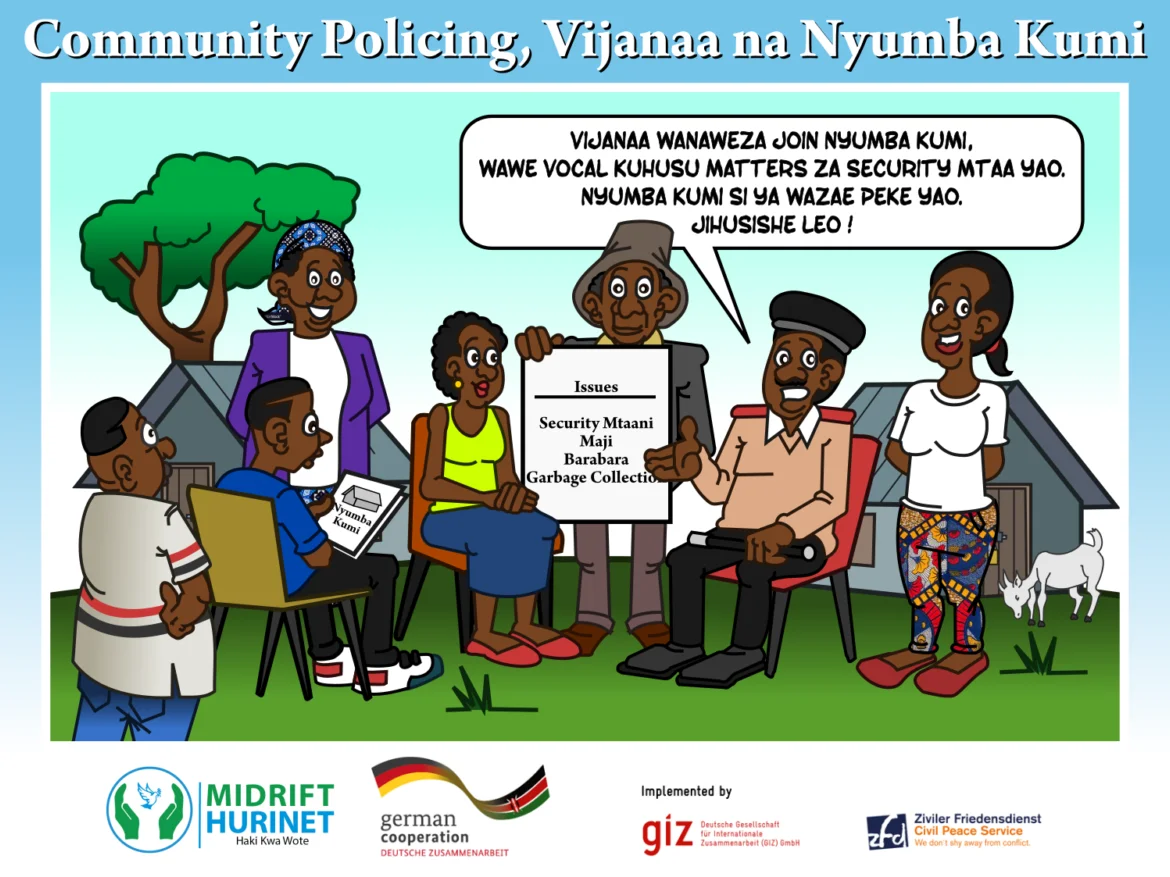
Hamza Ramadhan, a Youth from Bondeni ,participated in the pilot phase of the Youth-led Engagement for Peace andSecurity project implemented by MIDRIFT HURINET in partnership with GIZ-CPS.
Before that, he was not involved in any formal or informal security structure in the Community.
He shared how the project has enhanced peaceful coexistence within his Community after the involvement.
“I am a Human Rights activist and a Community Policing Committee (CPC) member.
I saw the need for us as Youth to be involved in security matters within our communities since we are directly involved, bring new ideas and creative approaches to resolving conflicts, are often more open to change, and can think outside traditional frameworks.
Young people help to design innovative solutions and learn conflict resolution and leadership skills; they are more likely to carry these values into adulthood, creating a culture of peace, channeling their energy into constructive activities, and reducing the likelihood of their involvement in violence or extremist movements.
We often have strong social networks and can act as mediators between different groups in a community.
These networks can bridge generational and cultural divides, fostering understanding and cooperation.
Participating in peace committees empowers young people to shape their communities actively. It helps combat feelings of marginalization and promotes social inclusion.
I received an invite to a youth platform on Peace and Security by MIDRIFT HURINET.
Upon attending, I learnt it was a partnership with a German-affiliated agency, Ziviler Friedensdienst / GIZ
During the forum, we were enlightened about the need for young people to join our communities’ formal and informal security structures.
I also learned that the Nyumba Kumi concept is open to Youth participation and involvement.
After the forum, one of my action points was to join the security structures; I followed it up and discovered that the Central Police Station was having its security committee elections.
I vied for the election as a youth representative and was successful.
I have used my position to champion the encouragement of Youth Participation in security structures, lobby for the Provision of training in conflict resolution, negotiation, and leadership for young people, create safe spaces for young people to voice their concerns and ideas, and recognize and value their contributions, offering mentorship and support and advocate for inclusion of Youth in decision-making processes and give them a stake in outcomes.
I thank MIDRIFT HURINET and GIZ for the capacity-strengthening forums on the Community Policing Committees and the opportunity to network with other stakeholders in the Security structures, which have been very important to us as Youths in Nakuru County.
I encourage other young people to join formal and informal security committees in their communities as their ideas and energy can help make their Community safer and stronger, can address concerns that matter to them, like safe schools, public spaces, and opportunities for Youth, develop skills like leadership, problem-solving, and conflict resolution.
These experiences will prepare them for future leadership roles in their communities.”
Important Information.
Community Policing Committees are established under the National Police Service Act of 2011.
They are further supported by the Community Policing Guidelines developed by the Ministry of Interior and Coordination of National Government.
Community Policing Committees derive their authority from these laws and guidelines, making them integral to Kenya’s broader framework for participatory security and policing.
National Police Service Act, 2011:
Section 96 This section provides for the establishment of community policing initiatives aimed at building partnerships between the police and the Community to enhance public safety and security.
The law empowers the National Police Service to collaborate with local communities in identifying security concerns and developing solutions.
The Constitution of Kenya, 2010:
Article 244: Mandates the National Police Service to work closely with communities to foster relationships, improve accountability, and prevent crime.
Community Policing Guidelines: These were introduced to provide a framework for implementing Community Policing Committees. They outline the committees’ roles, structures, and functions, emphasizing their advisory and problem-solving roles in promoting local security.
The Nyumba Kumi Initiative, a grassroots strategy for community policing in Kenya, derives its legal authority from the Prevention of Terrorism Act, 2012, and its implementation is guided by various frameworks and policies developed by the government. While Nyumba Kumi is not explicitly named in a specific standalone Act, its establishment and operations are supported by existing laws and policies related to public security and
community policing.
Prevention of Terrorism Act, 2012:
This Act provides for the establishment of measures to prevent and combat terrorism.
The Nyumba Kumi Initiative is implemented under the broader framework of enhancing community security and gathering intelligence at the grassroots level to counter threats, including terrorism.
National Police Service Act, 2011:
Section 96: Supports community policing and partnerships between the police and the public.
This Provision indirectly supports the Nyumba Kumi Initiative, as it builds on the idea of collaboration to address local security concerns.
The Constitution of Kenya, 2010:
Article 244: Requires the National Police Service to foster and maintain a close relationship with communities, making initiatives like Nyumba Kumi constitutionally aligned.
Article 238 Defines national security as the responsibility of the government and every citizen, underpinning community-based security initiatives.
Policy Framework:
The Nyumba Kumi Guidelines, developed by the Ministry of Interior and Coordination of National Government, provide operational guidance for these committees. These guidelines emphasize their role in promoting cohesion, security, and information sharing at the neighborhood level.
By
Jacob Karani



